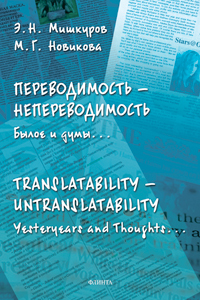 |
Тел.: (495) 336-03-11, факс: (495) 334-82-65. E-mail: flinta@mail.ru
ПРОСМОТР КНИГИ
| Автор: | Мишкуров Э.Н. |
| Название: | Переводимость — непереводимость: Былое и думы...= Translatability — Untranslatability: Yesteryears and Thoughts...:монография. |
| Раздел: | Перевод и переводоведение |
| Переплет: | Переплет |
| Страниц: | 248 с. |
| Издание: | 1-е изд. - М.: ФЛИНТА, 2024 |
| ISBN: | 978-5-9765-5353-8 |
| УДК: | 81’255 |
| ББК: | 81.2-8 |

|
В настоящей монографии впервые в отечественном переводоведении описывается целостная теория апории «переводимости — непереводимости» как неотъемлемой части современной науки о переводе. Показано, как инновационная «дискурсивно-игровая парадигма перевода» на базе авторского «когнитивно-герменевтического методологического стандарта» оптимально способствует реализации любого вида межъязыкового посредничества. Установлены реальные пути достижения коммуникативно-переводческого результата, базирующиеся на органическом сочетании «закономерных переводческо-языковых соответствий» всех степеней с «вольным набором» личностно-манипулятивных способов и приемов квазиперевода путем нейтрализации «непереводимостей» оригиналов различных текстотипов и их жанров на материале ряда европейских и восточных языков с целью достижения «форенизированной» или «доместифицированной» коммуникации. Работа предназначена для специалистов в области переводоведения и соответствующих социально-гуманитарных наук, аспирантов, магистрантов и студентов лингвистических университетов, а также всех лиц, интересующихся проблемами перевода. The monograph (for the first time in the modern history of translation studies both in Russia and abroad) outlines the holistic approach to investigating the “translatability — untranslatability aporia” as an integral part of translation methodology. The work is aimed at illustrating the way the innovative “translation discursive-game paradigm” on the basis of the author’s “cognitive-hermeneutic methodological standard” optimally contributes to any kind of interlingual communication. The effective methods at achieving an adequate communicative and translation result are based on the organic combination of “regular linguistic correspondences” of all degrees and “free set” of manipulative personal rendering methods and quasi-translation techniques with the purpose to assimilate the original text to the target some European and Oriental languages and their cultures by means of either domestication or forenization. The monograph is intended for specialists in the field of translation studies and relevant humanities as well as for graduate students, undergraduates and students of linguistic universities and also for all those interested in the problems of translation. |
|
© Издательство «ФЛИНТА», 2002–2024
|